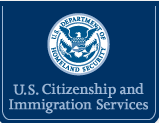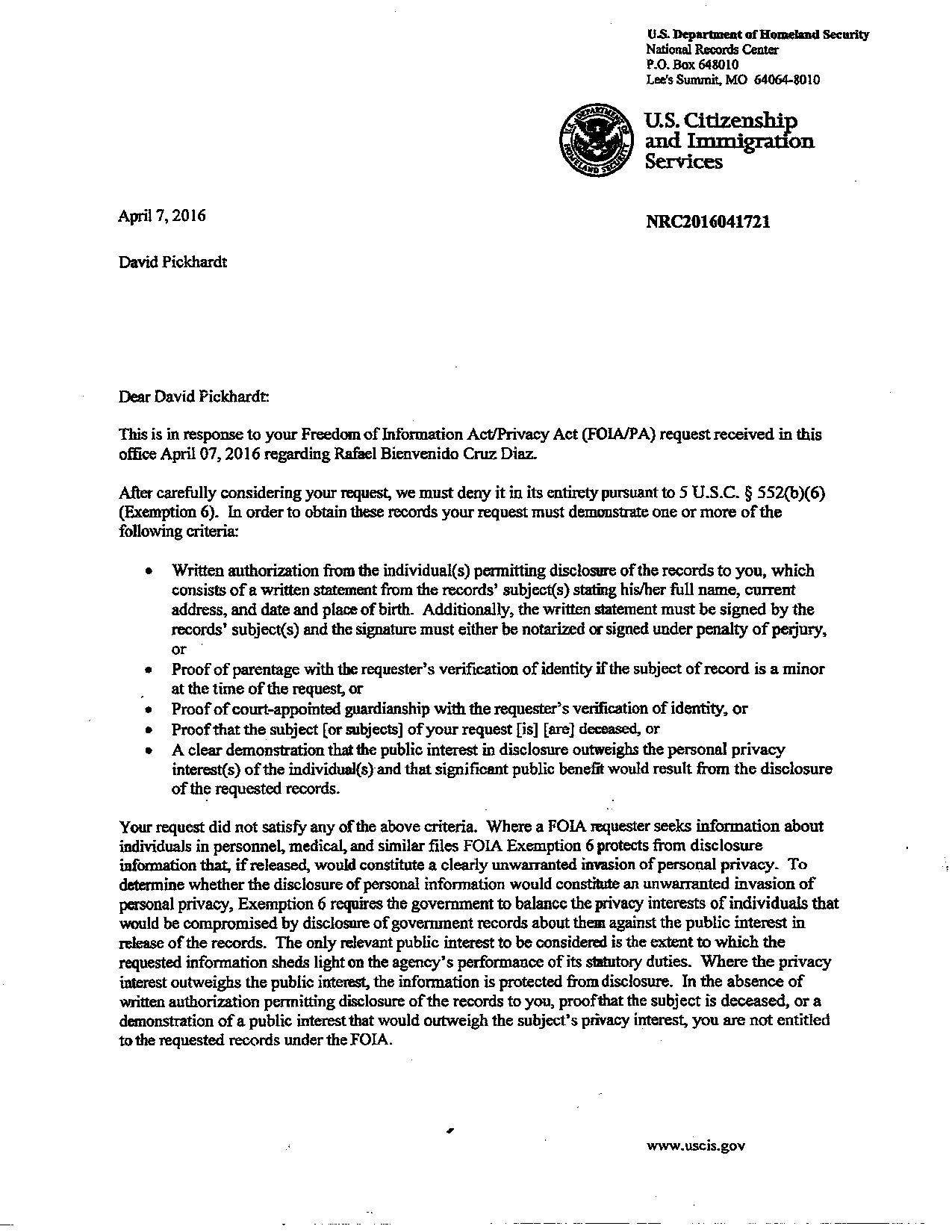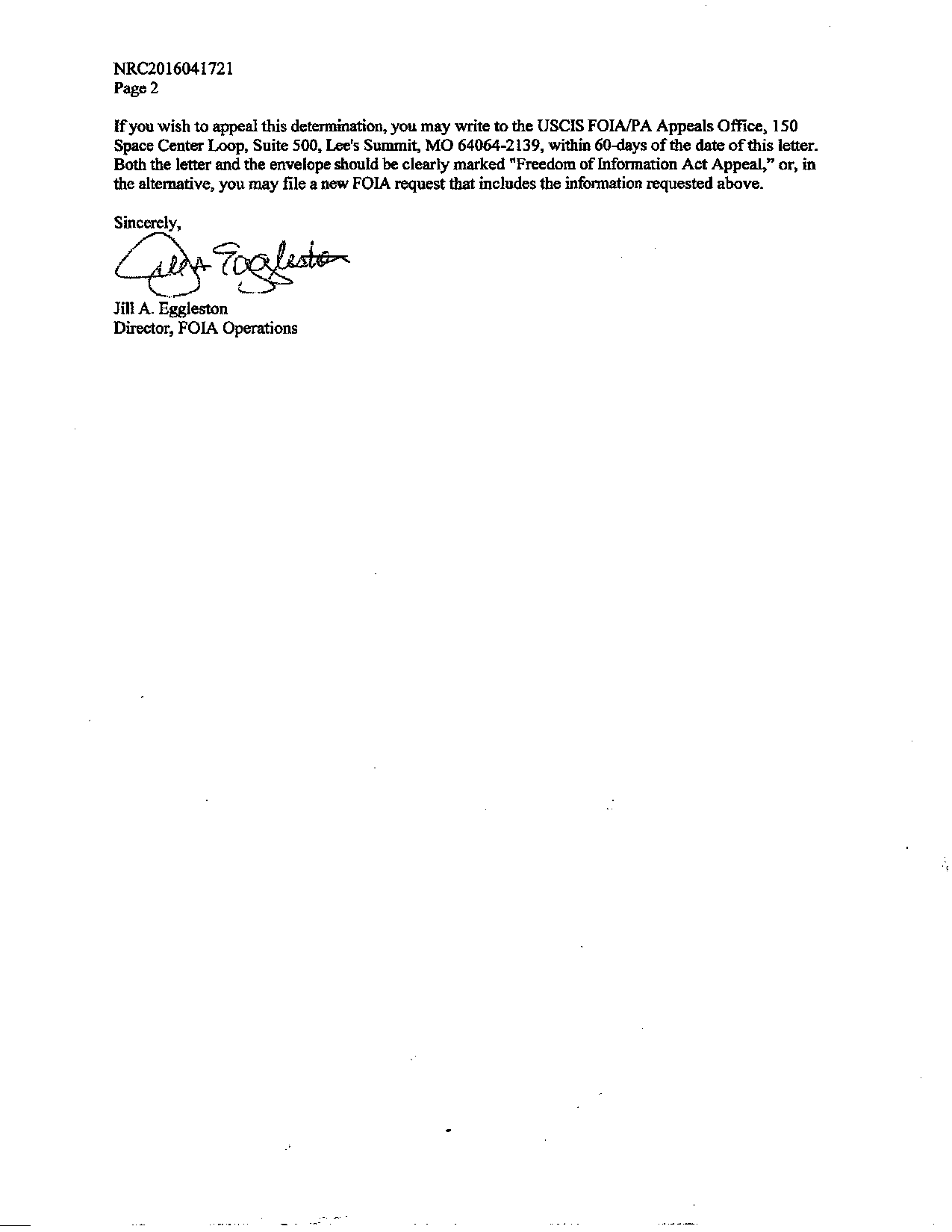“AN UNWARRANTED INVASION OF PRIVACY”
by David Pickhardt, ©2016
 (Apr. 25, 2016) — [Editor’s Note: The following request made under the Freedom of Information Act (FOIA) to U.S. Citizenship and Immigration Services (USCIS) demonstrates a citizen’s efforts to obtain documentation on the background of Rafael Bienvenido Cruz, father of presidential candidate Sen. Ted Cruz and one of his most vocal advocates.
(Apr. 25, 2016) — [Editor’s Note: The following request made under the Freedom of Information Act (FOIA) to U.S. Citizenship and Immigration Services (USCIS) demonstrates a citizen’s efforts to obtain documentation on the background of Rafael Bienvenido Cruz, father of presidential candidate Sen. Ted Cruz and one of his most vocal advocates.
The elder Cruz, who may have shortened his name from “Cruz Diaz” to simply “Cruz” after arriving in the United States in 1957, reportedly left Cuba on a student visa obtained in Havana as the result of a bribe. Cruz was an open supporter of Fidel Castro, who sought to overthrow then-Cuban dictator Fulgencio Batista and succeeded in 1959. Cruz would later claim that he and others were “duped” into supporting Castro, who he said did not know reveal that he was a communist.
Last March and April, The Post & Email submitted a number of respective FOIA requests to USCIS, the U.S. State Department, the Selective Service System, the U.S. Department of Education, the U.S. Department of Justice, and the Federal Trade Commission for documentation associated with the younger Cruz, who declared his presidential candidacy on March 23, 2015. It is common knowledge that Cruz was born in Calgary, Alberta, Canada on December 22, 1970 to Rafael Bienvenido Cruz and Eleanor Elizabeth Wilson, who used the last name of her former husband on Ted’s birth certificate.
After The Dallas Morning News published Ted Cruz’s birth document in August 2013, the future presidential candidate denied having known that he was a Canadian citizen his whole life.
As Cruz’s father was not yet a US citizen, many Americans have questioned his eligibility to serve as president given that one of the eligibility criteria is that the person elected be a “natural born Citizen.” Although the term is not precisely defined in our founding documents, many scholars and students of the U.S. Constitution believe that it refers to someone born in the United States. Still others believe that an eligible candidate must of been born in the U.S. to parents who were American citizens at the time of their child’s birth.
Rafael B. Cruz has insisted that his son is eligible by virtue of his birth to a U.S.-citizen mother.
Last week, The Post & Email attempted to contact the elder Cruz for an interview through his Grace for America website but has not thus far received a response.
In its May 2 issue, now available on newsstands, the National ENQUIRER claims that Rafael B. Cruz may have distributed pro-communist-Cuba leaflets in 1963 with Lee Harvey Oswald in New Orleans. According to the tabloid’s website in a post dated April 20, “Ted Cruz avoided commenting on his dad’s new photo scandal at a campaign event today, Radaronline.com has learned,” referring to the allegation it made by identifying Rafael B. Cruz in a photo with Oswald. The man the ENQUIRER said is Cruz has been unidentified by the FBI.
On Sunday, however, Ted Cruz denied the ENQUIRER’s claim about his father.
When Cruz went to Canada with Eleanor Wilson, he was still married to Julia Garza of New Orleans, LA.
Although Rafael B. Cruz’s biography states that he “is a powerful example of the American Dream. Born in Cuba, Rafael lived and suffered under a cruel, oppressive dictator. He began fighting Batista’s regime as a teenager and was imprisoned and tortured simply because he wanted to be free,” he built a lucrative business while in Canada between 1967 and 1974, not the United States.]
———————————




 On April 7, USCIS responded to Pickhardt’s letter as follows:
On April 7, USCIS responded to Pickhardt’s letter as follows:
Pickhardt has said that he plans to appeal USCIS’s decision to withhold the documentation it may hold on Rafael B. Cruz.
When The Post & Email asked him on what grounds he plans to file an appeal, he responded:
USCIS denied my FOIA request for this information citing Exemption 6 but then reverting to the Privacy Act as further support for their position. While the FOIA was passed in the 60’s, the Privacy Act was not passed until December 31, 1974 and it was not retroactive. USCIS cited numerous times that their rejection was based on protecting the privacy rights of individuals from unwarranted release of documents which would reasonably be considered to constitute an invasion of privacy rights of the individual(s).
However, as I pointed out in my appeal, the Privacy Act actually defines what they mean by “individual”. In the PA, an individual is defined as someone who is a U.S. citizen or an alien lawfully permitted to enter who is a permanent resident.
Additionally, the FOIA act provides that in the event an authorization from the individual(s) for whom one is attempting to seek records is not obtained, that they would still release information which would be severely restricted. The difference here is that with the permission of the person whose records are sought, all information would be released, including information which would be considered personally identifiable, such as medical, personnel, social security number, really, the whole ball of wax.
In the case of not having an authorization, what is released is redacted so that type of information is not made public.
The reason I think that a lot of rejected requests are not appealed is that the one requesting information doesn’t know exactly what they want. In my case, since there were specific documents which I knew they had, I could tailor my request toward those specific documents. That is why I went over the Form N-400 line by line to show that there was virtually nothing in that document which contained personally identifiable information and that it should be released not only on the ground that nothing could be constituted as an invasion of personal privacy but I also cited the PA act definition regarding what an individual is and for a great deal of the information I was requesting that Rafael B. Cruz was neither a U.S. citizen nor an alien lawfully permitted to enter who held permanent residence status. All of RBC’s records from when he applied to enter the U.S. on a student visa up until the time he obtained permanent residence status after applying for and receiving asylum were records when he was neither a citizen or a permanent resident. That would be everything from 1957 until probably around 1962. After RBC went to Canada, he lost his permanent resident status here in the states. There is a very limited timeframe in which one can be gone from the states before losing permanent resident status and it is measured in months, not years. RBC started a business in Canada and obtained citizenship in Canada. Even when he left Canada and went to Texas and found Jesus and then returned to Canada to get the family he previously abandoned, he was still a Canadian citizen. Sometime after 1975 he probably reapplied for permanent resident status in the U.S. So, for the period of around 1967/8 until sometime after 1975, RBC was neither a U.S. citizen nor an alien lawfully admitted to the U.S. with permanent resident status. Therefore any records our government has pertaining to those years for RBC would enjoy no protection from release based on the FOIA/PA.
As such, RBC, had no protection under the PA (excepting personally identifiable informaton).
Now, regarding your comment that you asked for things about Ted, not his father, I have also. And the DOS has sent me confirmation that they have not only assigned case numbers to those requests but that they are compiling the information requested based on the information I have supplied them and would get those documents, review them, and presumably release them.
Unlike a lot of FOIA requests, these were not rejected out of hand. I have been told they have assigned case officers to compile the information. All I can do with those is wait and see.





Issue them a writ of Quo Warranto, They work for you as you are the Master they are the Public Servants.
http://www.constitution.org/writ/quo_warranto.htm